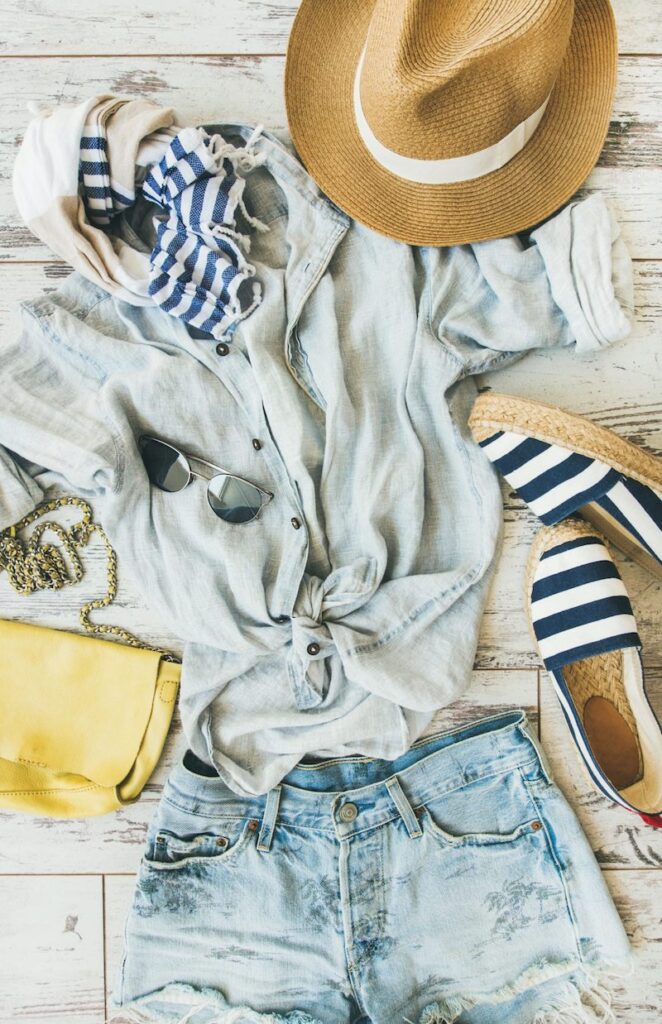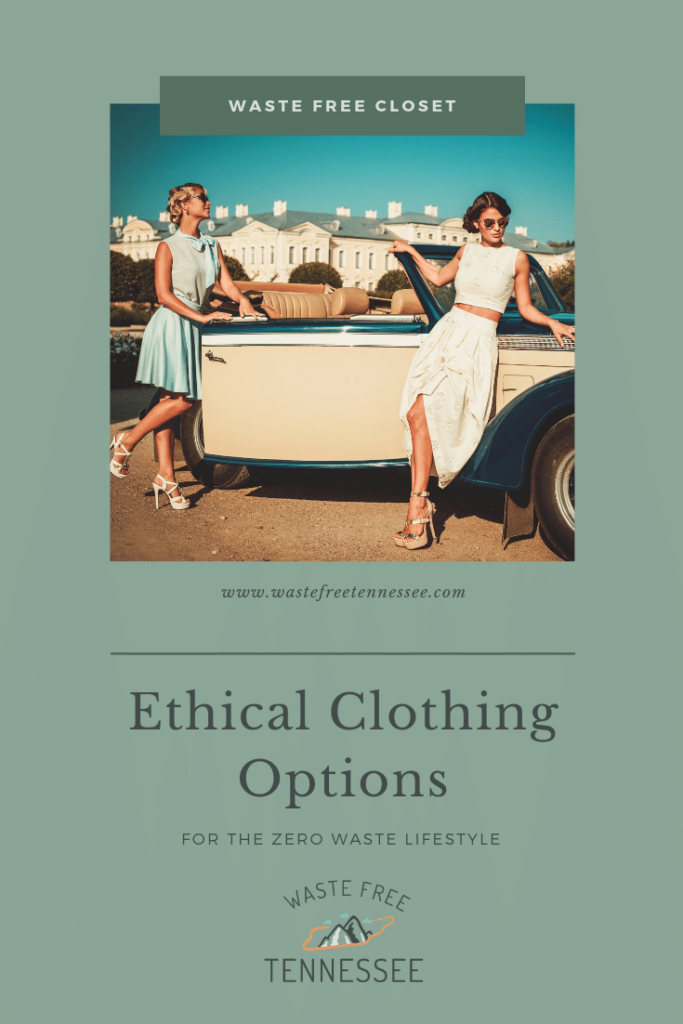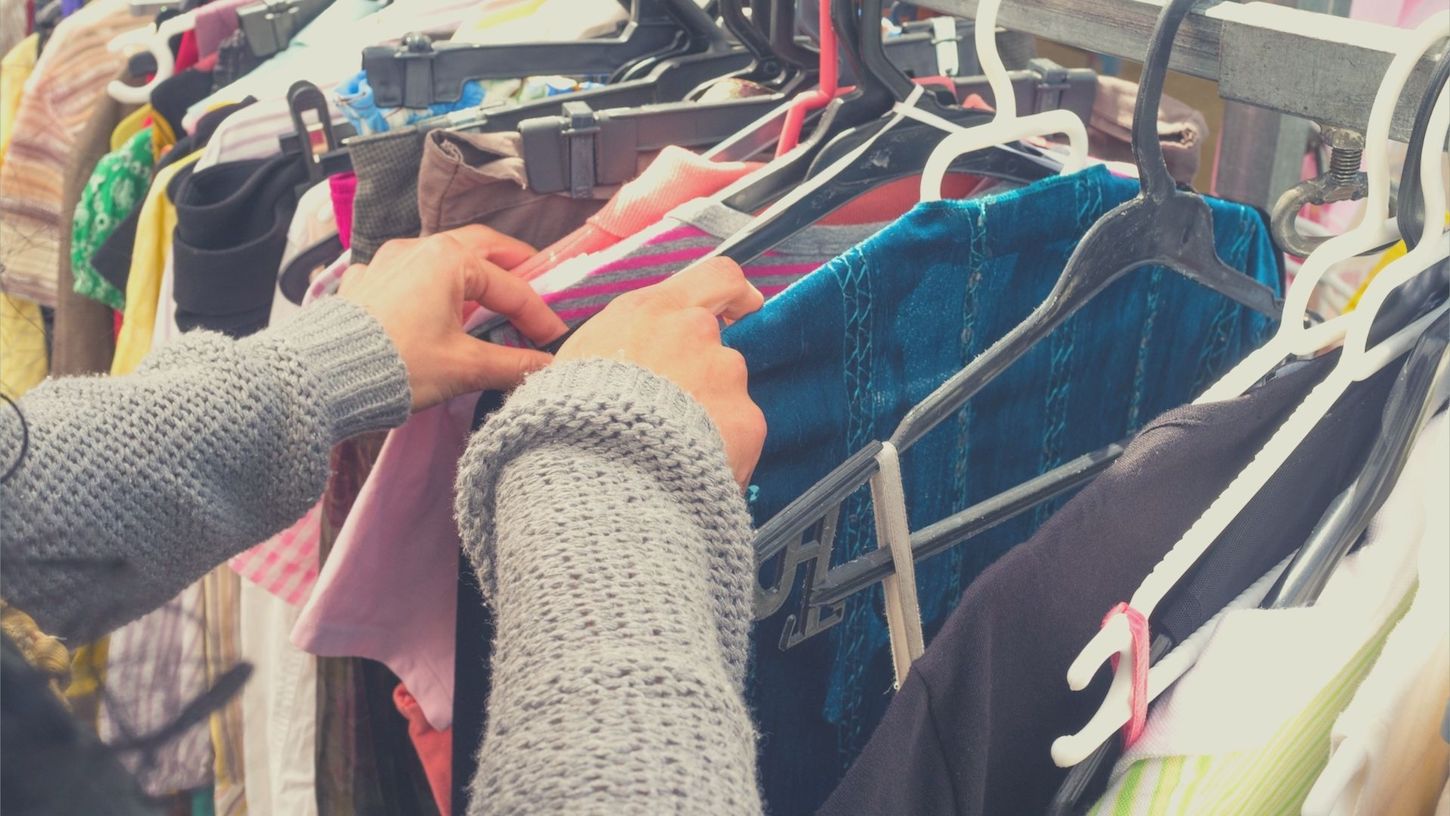Did you know that clothing is one of the most significant environmental problems, along with housing, transportation, and food?
Ethical Clothing Options
The fashion industry has a detrimental impact on the environment – in fact, according to EcoWatch, Fast Fashion is the Second Dirtiest Industry in the World.
All of these recommendations may not suit your lifestyle. One or two of them will be enough to help you stay stylish and make ethical clothing purchases.
Purchase second-hand clothing
When you buy clothing from a second-hand shop, you are making a sustainable purchase. Every time you buy used clothing you are keeping one more item out of the landfill. Your purchase also keeps local thrifts shop in business and your dollar going back into your local community. Win-win.
You can make your ethical purchases even more effective when you shop for sustainable clothing brands at a second-hand shop! Being budget-friendly and ethical are two of the main reasons why I buy more and more of our clothing from second-hand shops.
Choosing second-hand clothing means that you are making a waste free purchase and you are not contributing to the demand for clothing manufacturers to produce more clothing.
Clothing Swaps
You’ve probably done this at least a few times in your lifetime. During high-school and college my friends and I would frequently swap clothes to expand our wardrobes. Perhaps you have an upcoming event that you need an outfit for but know you will only wear it one time. Consider borrowing an outfit from a friend or relative.
Another time that I have swapped rather than buy, is during pregnancy. My best friends and I all took turns wearing our maternity clothes because buying something to wear for less than a year is a hit on the environment not to mention the budget.
Check your local community for clothing swaps. This is when a shop will open its doors to allow people to bring in gently used clothing in exchange for taking home another item – piece for piece.
Buy locally
Local clothing shops and boutiques are another good way to make an ethical choice in clothing. When you shop at a local boutique, you can ask where they clothing came from, see the quality and support your local business owners.
If you still prefer to purchase your clothing brand-new, consider taking your items to a second-hand or consignment shop so that they will be reused and kept out of the landfill.
You can be ethically fashionable by donating your gently used clothing to a homeless shelter, battered women’s shelter, or local church that has a freebie-closet.
Hire a tailor
I know this is an option that many will opt out of. Still, it is a viable option. Especially if you are like my friends and I who appreciate fine-looking unique clothing styles! Do a web search for tailors near you or an alterations shop. You may be surprised at how affordable this can be. My daughter has her military uniforms altered, my husband has his clothing altered sometimes; it just makes sense to check out this option.
My dad used to have his suits made specially for him as he was a tall slender man. His tailor made his clothing so well that it is still in good condition well after he passed away. My daughters have worn his shirts!
What to look for in fabrics
How about cotton?
Ethical clothing is made from materials that are grown or manufactured in an environmentally friendly way. Many people automatically assume organic cotton is the best choice.
Organic cotton is a sustainable alternative to regular cotton as farmers do not use pesticides to grow the cotton so workers aren’t exposed to chemicals. Organic cotton, still requires a lot of water to grow and is a rather expensive industry.
If you are going to spend the money on organic cotton fabrics, look for the GOTS-certification so that you will know it is worth what you are paying.
To make one pair of cotton jeans requires 2,108 gallons of water, 659 gallons to make a cotton t-shirt. According to hidden water in everyday objects.
Recycled cotton is a sustainable choice as it has the potential to help reduce water and energy consumption and keep clothes out of the landfill. You will also find recycled denim in packing materials sometimes when you buy from eco-friendly companies, like Sun-Basket. Make sure to recycle your denim after you wear it out! Some manufacturers make it into nontoxic insulation. Last time I checked, the company had collected 2.5 million items of denim which diverted more than 1230 tons from the landfills.
The Amazing Hemp Plant
Hemp is considered the most versatile plant on earth as it can feed, clothe, clean and medicate, humans! Not to mention, hemp is a durable fabric that only gets better with time. With each wash and wear, the material becomes softer. When you are ready to discard hemp clothing, it is biodegradable.
Linen
Organic linen is a natural and sustainable fabric which is also biodegradable. Eco-friendly linen is naturally moth resistant and robust, so it lasts longer than other materials. Linen is made from the flax plant and is breathable yet absorbent without holding bacteria. Compost linen to keep it out of the landfill!
Wool
For non-vegans, wool is an incredibly environmentally friendly option. It is wrinkle-resistant, so it stays looking good without the chemicals used in “wrinkle-free” clothing. Wool is an excellent water repellant, meaning wool can be a more ethical choice than microfiber.
Fabrics to avoid
Unfortunately, microfiber can cause problems for aquatic life and other animals long after manufacturing. Even if you don’t care about animals, but really, who doesn’t – it’s showing up in water and food consumed by humans! Microfiber beer anyone?
Choose organic fabrics when the option is available. Fast fashion is an ethical disaster. When you choose high-quality clothing made with ethical materials, you may pay more. That’s okay because this clothing is typically higher quality and buying less clothing is very ethical!
If you do prefer the feel of polyester fabric, opt for recycled polyester which uses PET from plastic water bottles broken down into fibers. The process takes 33-53% less energy than virgin polyester. “Garments created from recycled polyester can be recycled again and again with no degradation of quality.”

Which clothing brands are best?
Many clothing manufacturers will donate a percentage of the proceeds from each purchase to support fair wages. Rather than take up space and your time writing about which clothing brands are best, I recommend downloading the app Good On You.
Register your email and then look up brands to see how they measure up. Type in the brand and get the rating.
Type in “Free People,” and you’ll see the rating “not good enough.” If you click on the result, you will see that the company has not set concrete goals to reduce its environmental impact and more. The app will give you suggestions for similar brands. Be prepared for a surprise.
Watch out for fast fashion and wasteful company policy
Another tip is to keep your eyes open. At one point in my life, I shopped Victoria’s Secret. Later I stopped because it seemed the quality had gone down-hill. This year (2019) I decided to try the store again.
During checkout, an employee was standing at the register cutting up perfectly good clothing. I stared in disbelief. Finally, my curiosity got the best of me, so I asked what on earth she was doing. Apparently, returns are destroyed as a store policy. That was the last time I walked into that store and I will never go back. (Yes, never, I am all-or-nothing that way.)
[Tweet “During checkout, an employee was standing at the register cutting up perfectly good clothing. I stared in disbelief.”]
We can’t be aware of every single unethical practice that clothing manufacturers commit but we can help by talking about this openly. Sharing what you know or simply avoiding fast-fashion can be a great benefit. Sharing this post will help others who may not be aware how much clothing ends up in landfills.
So, please help us spread the word about making ethical fashion choices by sharing this post!
I certainly am not an expert when it comes to ecofashion, emphasis on fashion! This is still a topic I a care about deeply. If you know of any ethical companies you’d like to recommend, or practices that you think are worth mentioning, I hope you will share those in the comments below.

